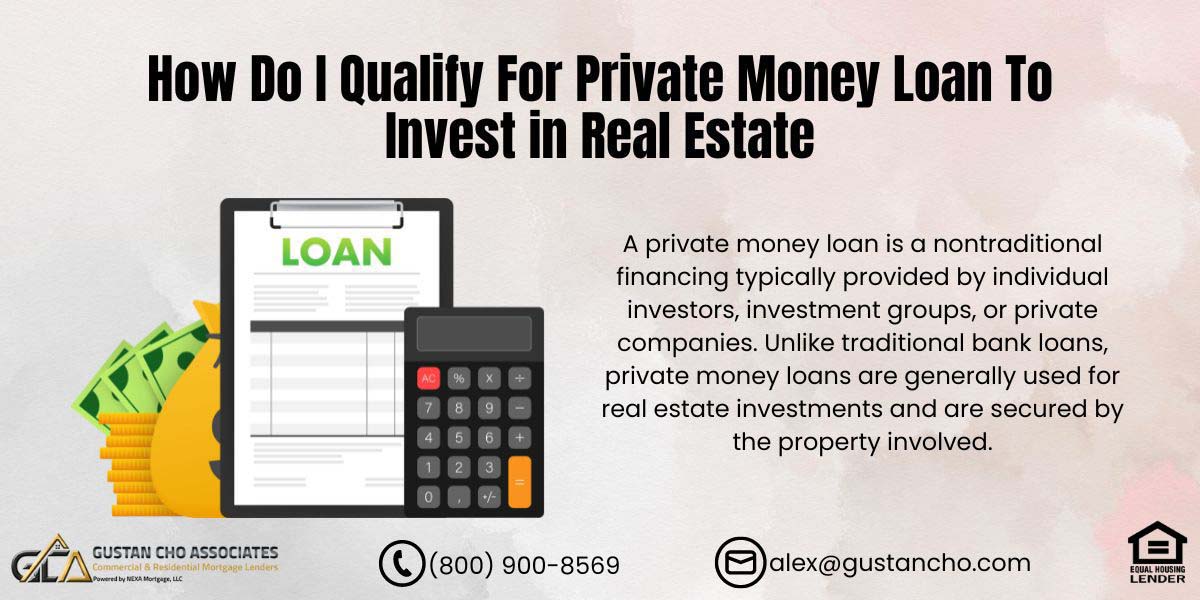This guide covers the frequently asked question how do I qualify for private money loan to invest in real estate. We will thoroughly go over how to qualify for private money loan for investment real estate properties. The most important step is to know the general rules is most private and hard money lenders use as a guiding principle to making private money loan.
The principle of a lender of hard money and private money loan is generalized. Different lenders will have different “niche” products, and may vary from what you are about to read.
Knowing and understanding the “3 Golden Rules of Private and Hard Money Lending” is a good start to learning the thought process of how such lenders underwrite their lending decisions. In essence, to be successful at getting a Private or Hard Money Loan, it is important to understand how the actual lenders think. In this article, we will discuss and cover how do I qualify for private money loan to invest in real estate.
What is a Private Money Loan
A private money loan is a type of financing provided by non-institutional lenders. Unlike loans from banks or other traditional financial institutions, private money loans often come from individual investors or companies that see value in this potentially risky investment. Here are key aspects of private money loans:
Want to Fund Your Real Estate Investment with a Private Money Loan? Start Here!
Private money loans are a fast way to finance your real estate projects. Reach out now to learn how you can qualify for this flexible financing option.
Source of Funding of Private Money Loan
Generally interest rates on private money loans are higher than those offered by banks due to the higher risk associated with these loans. Rates are often in the double digits. Private money loan is offered by several types of investors. Here are the three most common types of private money lenders.
- Individual Investors: These are often people with available capital and looking for a higher return on investment than traditional saving methods.
- Investment Groups: These can be groups specifically formed to pool resources and fund various types of loans.
- Private Companies: Specialized finance companies that are not governed by the same regulations as banks might also offer these loans.
Loan Terms of Private Money Loans
Terms can be much shorter than traditional loans, ranging from a few months to a few years. The structure can vary significantly depending on the agreement between the borrower and the lender. Private money loans is common in real estate investments, particularly for renovation projects, flips, and other situations where traditional financing may be hard to obtain or need to be more flexible. It is sometimes used by small business owners or individuals who cannot secure financing through banks due to credit issues or unconventional investment proposals.
Collateral Required For a Private Money Loan
They are typically secured by the purchased property or another form of real estate as collateral to protect the lender in case of default. The loan amount is usually based on a percentage of the property’s value, known as the loan-to-value (LTV) ratio.
Approval Process of Private Money Loan
Faster and more flexible than traditional bank loans. Lenders focus more on the collateral and the project’s potential than the borrower’s credit history. Due diligence is often still conducted but can be less stringent than traditional financing.
Risks of Private Money Loan
Both the borrower and lender face higher risks. Borrowers face higher interest rates and more severe default terms, while lenders risk higher losses if the investment fails.
What is The Key Difference of Hard Money and Private Money Loan
Private money loans and hard money loans are both non-traditional financing options commonly used in real estate and other high-risk investments. While they share some similarities, they have distinct differences primarily based on the source of the funds, the terms of the loans, and the relationships involved.
Private Money Loans
Private money loans are typically sourced from individual investors or small groups of people the borrower may know personally, such as friends, family, or business associates.
Terms and Flexibility
The terms are often very flexible, negotiated between the borrower and the lender based on their relationship. Interest rates might be lower compared to hard money loans due to the personal relationship.
Purpose and Approval
Private lenders may offer funds for a variety of reasons, not limited to real estate. The decision may be based more on personal trust and the borrower’s character. The approval process can be informal and based more on the relationship than strict lending criteria.
Hard Money Loans
Hard money loans come from professional hard money lenders or companies that are in the business of offering loans secured by real estate. These lenders do not typically have a personal relationship with the borrower.
Terms and Flexibility of Hard Money Loans
Hard money loans are usually short-term, often between 6 months to a few years, with higher interest rates reflecting the higher risk. The terms are not as flexible since they adhere to a more standardized process.
Purpose and Approval of Hard Money Loans
Specifically focused on real estate investments, particularly for renovation, quick purchases, or real estate development projects. The approval process is fast but heavily focuses on the value of the collateral property rather than the borrower’s creditworthiness.
Key Differences of Hard Money and Private Money Loan
Relationship: Private money loans are often based on personal relationships and trust. Hard money loans are more transactional and professional. Regulation and Professionalism: Hard money lenders are generally more regulated and operate more formally compared to private money lenders.
While both loan types serve to bridge gaps in traditional financing, the choice between them can depend on the borrower’s relationships, the need for flexibility in terms, and the specific financial needs of the project or investment.
Purpose of the Loan: While both can be used for real estate, hard money is more exclusively associated with real estate investments. Private money can be more versatile, potentially used for business startups, personal loans, or other needs where the borrower wants to avoid traditional bank loans.
Getting Approved For Private Money Loans
In a previous article, we covered the “3 Golden Rules” of private money, and hard money lender. We will brief you and summarized on what we covered. If you have a lot of equity on your single-family home, 1-4 unit, or commercial property, they will lend you money, If you have a good exit strategy or purpose for borrowing the money, you are more likely to get the loan. Real estate investors need private or hard money to buy investment properties fast with little to no income documentation. Private money and hard money loans require no income docs and can close in less than one week.
Looking to Invest in Real Estate with a Private Money Loan? We Can Help You Get Approved!
Reach out today to learn more about how we can help you qualify for financing.
Why Do Real Estate Investors Use Private Money Loan Options
Why do real estate investors need private or hard money? Investors with bad, mediocre, or great credit need private or hard money loans because there is no red tap and funds within one to two weeks. Investors use private or hard money loans if they are going to fix and flip properties, or need to renovate a property that is not financeable due to renovations that is needed. Private and hard money loans are all short-term bridge financing.
Mortgage Rates on Private Money Loans
You are going to pay a higher rate than you would at a bank which is typically from 12-15% as opposed to 4.5-5.5%. So, reflect back to “Golden Rule” number 2. This because you will have to demonstrate to the Private Money Lender or Hard Money Lender why borrowing the money at a higher rate will improve your overall financial position. The Private Money Lender and Hard Money Lenders want you to make money so you can keep coming back and borrowing more money. They don’t want to be foreclosing and having their attorneys make money.
Qualification Requirements For Private and Hard Money Financing
Let’s look at the first Golden rule of private money loan and how I qualify for a private money loan. A borrower has a rental property worth $200,000. He has a mortgage for $50,000 and needs $50,000 to buy a house that he wants to rehab and flip. He needs $100,000 which is 50% of $200,000. He has a loan to value of 50% and therefore has 50% equity. In the above example the borrower has a lot of equity. According to the first rule, this looks like a good deal. To further evaluate the equity position of the lender they are going to look at the surrounding neighborhood to make sure the subject property is not in a complete war zone. They are probably going to ask a Realtor or 3rd party inspection service for a BPO or Broker Price Opinion with interior photos. In some cases, they may want an actual appraisal. All of these types of property evaluations will be at the borrower’s cost. The cost of such services. BPO is the most cost-efficient.
How Are You Going To Pay Off Your Private Money Loan?
The second rule protects both the Private Money Loan and Hard Money Loan Lender and the borrower. It’s just not good business sense to make a loan to someone that either currently or at some future date will not have the ability to repay the debt. These lenders are interested in getting double-digit returns on their investment. They can’t get 12 % interest at the bank. They are not interested in making loans to borrowers who are not going to pay.
Private Money Lenders Want To Know The Borrower’s Exit Strategy
Having an “Exit Strategy” only makes sense for both parties. Here are 2 good examples of exit strategies: A borrower has great credit and income and her bank approved her for a loan. But the appraisal noted the property had a porch that was not up to code. It needs a whole new roof, and siding has been replaced. The cost of this work due to the size of the property is almost $35,000.
The exit strategy out of the private money loan is once the investor completes the renovations, the real estate investor will refinance the property with the bank that already approved her.
A borrower is pulling $150,000 out of their free and clear 2-unit worth $250,000. He is buying a house for $38,000 that needs $100,000 for renovation. The aftermarket value of the property he plans on purchasing is $250,000. He plans on listing the property and selling it. Also, in this case, the borrower made his money when he bought the property. This means he bought right and has a huge profit margin. He and the lender know even if a few unforeseen problems happen with his project, the project will still make a profit.
Private and Hard Money Loans Are Short Term Loans
The 3rd Golden Rule is just as important as the first 2 in that you have to be able to make the payments. Many of these loans are short term. However, if a borrower is earning $30,000 a year, lending that borrower $200,000 at 15% interest doesn’t make sense. Even though Private and Hard Money Lenders don’t put borrowers through the same scrutiny of banks, credit unions, and more traditional lenders.
Lenders of hard and private money loans still perform due diligence and want to have some sort of reassurance the borrower has the ability to repay the terms of the loan.
For this reason, most of these loans are interest only to keep the payments down. Many lenders escrow the first several payments-especially if there is a construction that will be in progress. Most of the time it is hard to keep renters in place when a property is in the process of renovation.
Qualify For Private Money Loan
Most of the rules are simply make common sense. These are higher rate loans with less income documentation, but they are still recorded mortgage loans. Understanding these rules will make the Private and Hard Money Lending experience a lot easier.. If you have any questions or comments or would like a referral to a reputable Private or Hard Money Lender, please contact us at Gustan Cho Associates at 800-900-8569 or text for a faster response. Or email us at gcho@gustancho.com.
FAQs: How Do I Qualify For Private Money Loan To Invest in Real Estate
- What is a Private Money Loan? A private money loan is a nontraditional financing typically provided by individual investors, investment groups, or private companies. Unlike traditional bank loans, private money loans are generally used for real estate investments and are secured by the property involved.
- How do I qualify for a Private Money Loan? Qualifying for a private money loan primarily involves having sufficient equity in a property, a viable exit strategy for paying off the loan, and a property that meets the lender’s standards. Lenders focus more on the collateral and the project’s potential than the borrower’s credit history.
- What are the typical terms of a Private Money Loan? Private money loans typically come with shorter terms than traditional loans, lasting from a few months to a few years. Interest rates are generally higher, often in the double digits, reflecting the higher risk the lender assumes.
- What is the approval process for a Private Money Loan? The approval process for these loans is faster and more flexible than traditional bank loans. Lenders emphasize the value and potential of the collateral property and conduct due diligence accordingly. However, this might be less stringent than traditional financing.
- What are the risks associated with Private Money Loans? Both borrowers and lenders face higher risks with private money loans. Borrowers deal with higher interest rates and more stringent default terms. At the same time, lenders risk significant losses if the investment fails.
- What is the difference between Hard Money and Private Money Loans? While both are non-traditional financing options used in real estate, the key differences lie in their sources, terms, and relationships involved. Private money loans often come from a personal network and feature more flexible terms. In contrast, professional lenders offer hard money loans with more standardized terms and focus heavily on the property’s value.
- How do Private Money Lenders evaluate potential borrowers? Lenders evaluate borrowers based on the equity in the property (loan-to-value ratio), the feasibility and profitability of the proposed project (exit strategy), and the borrower’s ability to make loan payments, typically through interest-only payments or other accommodating structures.
- What collateral is required for a Private Money Loan? The collateral is usually the real estate property being purchased or invested in. The loan amount typically depends on the property’s value, specifically focusing on the loan-to-value (LTV) ratio.
- Can I use a Private Money Loan for purposes other than real estate? While typically used for real estate investments, private money can also fund business startups, personal loans, or other scenarios where traditional financing is not feasible or desired.
- What should I consider before taking a Private Money Loan? When considering taking out a loan, various factors such as the higher interest rates, the short-term nature of the loan, your ability to repay it, and your strategy for exiting the loan should be considered. A solid plan that meets the lender’s requirements and safeguards your financial interests is essential.
These FAQs aim to cover the essential aspects of securing and managing a private money loan for real estate investment. For further details or specific inquiries, contacting a professional like Gustan Cho Associates can provide more personalized guidance and help connect with reputable lenders.
Related> Private Money Lending
Ready to Invest in Real Estate? Get Qualified for a Private Money Loan Today!
Contact us today to learn how you can qualify for the financing you need to make your next investment.









